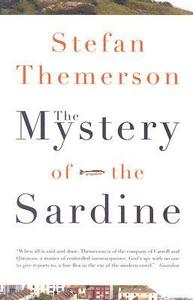Take a photo of a barcode or cover
The narrative structure of this book is close to perfect. Every time there's a clear path forward, it shifts its center of gravity slightly and the story becomes something else. These shifts are not in any way drastic or jarring. They could conceivably pass unnoticed as the reader is drawn in by the elements of the new composition. Everything is held together by a handful of themes and minor subplots. Themerson makes this all work in a way that avoids feeling fragmented or less than whole. Very pleasurable reading.
As other reviewers have noted, the description of the book makes it sound like a work of absurdism. It's anything but. There are a few slightly absurd threads, but they're kept well within their place. I don't think there's a word for what this is. To dismiss it as post-modern would be unacceptably lazy.
As other reviewers have noted, the description of the book makes it sound like a work of absurdism. It's anything but. There are a few slightly absurd threads, but they're kept well within their place. I don't think there's a word for what this is. To dismiss it as post-modern would be unacceptably lazy.
So weird. Mildly amusing, but I feel like I need to read it with a friend. Or a lot of annotations.
I am not sure why I am giving this book 2 stars when I finished it thinking that I would like to have the time I spent reading it back, please. I guess because I think the author probably had a point that I missed and because it seems like serious literature in a way, much as Joyce's Ulysses did to those who managed to read it.
I was misled by the word "mystery" in the title, by the fact that the plot involves an exploding poodle, and by the snippet from The Guardian's review on the front comparing the author to Lewis Carroll. I expected a weird pseudo-mystery with at leasta an answer or two that made sense at the end -- like the answer to the question: What was the point?! I described this book to a friend as Kafkaesque, and I am sure Kafka would have enjoyed it, but at least when I finish reading something by Kafka I understand what he was getting at. All I can determine from pondering this book is that the entire point was that there is no point. Aargh!
A friend has this book on her wishlist, so I will send it to her, by I will include this review as a warning because it may not be what she was expecting.
I was misled by the word "mystery" in the title, by the fact that the plot involves an exploding poodle, and by the snippet from The Guardian's review on the front comparing the author to Lewis Carroll. I expected a weird pseudo-mystery with at leasta an answer or two that made sense at the end -- like the answer to the question: What was the point?! I described this book to a friend as Kafkaesque, and I am sure Kafka would have enjoyed it, but at least when I finish reading something by Kafka I understand what he was getting at. All I can determine from pondering this book is that the entire point was that there is no point. Aargh!
A friend has this book on her wishlist, so I will send it to her, by I will include this review as a warning because it may not be what she was expecting.
This is a note on both The Mystery of the Sardine and Hobson's Island, Stefan Themerson's two final novels before his death in 1988. According to the introduction to the latter, the previous thing that Themerson had published was an essay suggesting that a university should fund a "Chair of Decency". "Contrary to what clergymen and policemen want us to believe, gentleness is biological, and aggression is cultural; not vice versa.... All ideologies, all missions, all aims corrupt.... Because, when all is said and done, decency of means is the aim of aims." These are themes emphasized over and over in Hobson's Island and, to a less obvious extent, in The Mystery of the Sardine. They are books written by someone who is not afraid to turn conversations into philosophy lectures, for whom characters are vehicles for ideas, and whose plots are quite deliberately ridiculous; after all, nothing could be more absurd than the human predicament in that Cold War age when all ideologies and all reason had led to the brink of global annihilation. To judge by these novels, Themerson seems similar to one of the characters in Hobson's Island, Sean D'Earth: a reluctant atheist who thinks there ought to have been a just God, and a betrayed lover of science who sees his beautiful vision of evolution thriving on the love of parent to child cruelly perverted by weapon-builders. Yet, until the despairing end of the second book, the mood is mostly one of gentle, if uneasy, lunacy, in which terrifying events can be overcome by those characters (mostly women) who understand that "Axioms are mortal, politics are mortal, poetry is mortal,–good manners are immortal."


